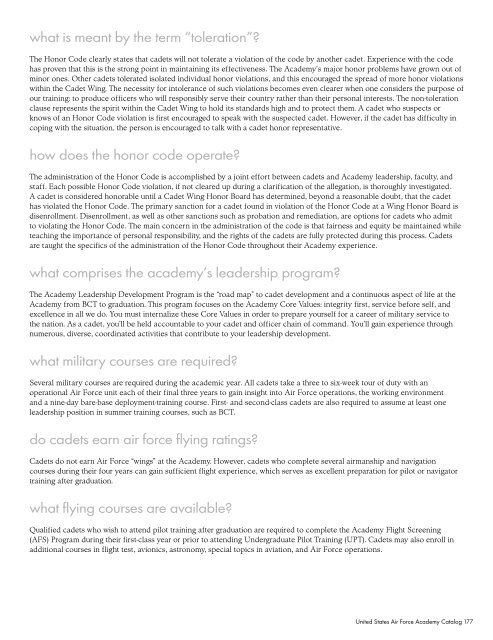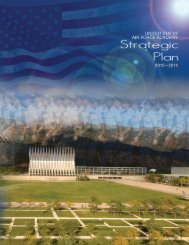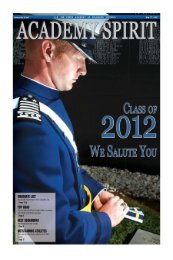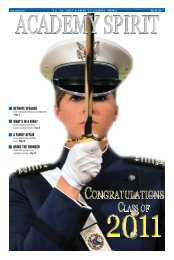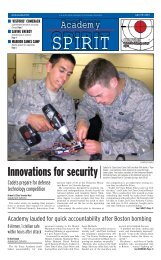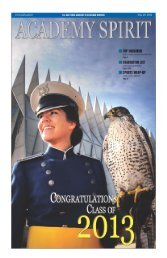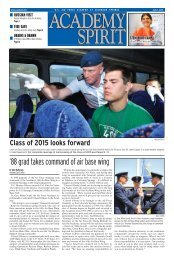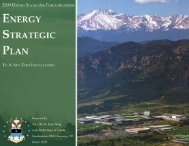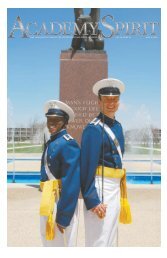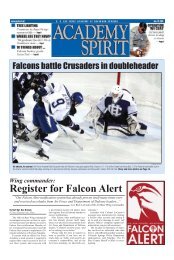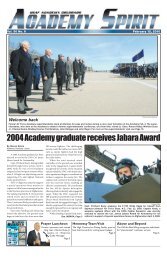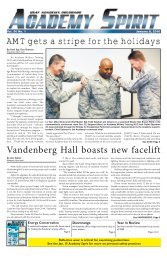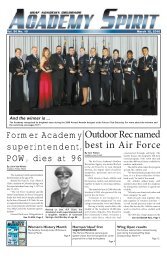2008-2009 Catalog - United States Air Force Academy
2008-2009 Catalog - United States Air Force Academy
2008-2009 Catalog - United States Air Force Academy
Create successful ePaper yourself
Turn your PDF publications into a flip-book with our unique Google optimized e-Paper software.
what is meant by the term “toleration”?<br />
The Honor Code clearly states that cadets will not tolerate a violation of the code by another cadet. Experience with the code<br />
has proven that this is the strong point in maintaining its effectiveness. The <strong>Academy</strong>’s major honor problems have grown out of<br />
minor ones. Other cadets tolerated isolated individual honor violations, and this encouraged the spread of more honor violations<br />
within the Cadet Wing. The necessity for intolerance of such violations becomes even clearer when one considers the purpose of<br />
our training: to produce officers who will responsibly serve their country rather than their personal interests. The non-toleration<br />
clause represents the spirit within the Cadet Wing to hold its standards high and to protect them. A cadet who suspects or<br />
knows of an Honor Code violation is first encouraged to speak with the suspected cadet. However, if the cadet has difficulty in<br />
coping with the situation, the person is encouraged to talk with a cadet honor representative.<br />
how does the honor code operate?<br />
The administration of the Honor Code is accomplished by a joint effort between cadets and <strong>Academy</strong> leadership, faculty, and<br />
staff. Each possible Honor Code violation, if not cleared up during a clarification of the allegation, is thoroughly investigated.<br />
A cadet is considered honorable until a Cadet Wing Honor Board has determined, beyond a reasonable doubt, that the cadet<br />
has violated the Honor Code. The primary sanction for a cadet found in violation of the Honor Code at a Wing Honor Board is<br />
disenrollment. Disenrollment, as well as other sanctions such as probation and remediation, are options for cadets who admit<br />
to violating the Honor Code. The main concern in the administration of the code is that fairness and equity be maintained while<br />
teaching the importance of personal responsibility, and the rights of the cadets are fully protected during this process. Cadets<br />
are taught the specifics of the administration of the Honor Code throughout their <strong>Academy</strong> experience.<br />
what comprises the academy’s leadership program?<br />
The <strong>Academy</strong> Leadership Development Program is the “road map” to cadet development and a continuous aspect of life at the<br />
<strong>Academy</strong> from BCT to graduation. This program focuses on the <strong>Academy</strong> Core Values: integrity first, service before self, and<br />
excellence in all we do. You must internalize these Core Values in order to prepare yourself for a career of military service to<br />
the nation. As a cadet, you’ll be held accountable to your cadet and officer chain of command. You’ll gain experience through<br />
numerous, diverse, coordinated activities that contribute to your leadership development.<br />
what military courses are required?<br />
Several military courses are required during the academic year. All cadets take a three to six-week tour of duty with an<br />
operational <strong>Air</strong> <strong>Force</strong> unit each of their final three years to gain insight into <strong>Air</strong> <strong>Force</strong> operations, the working environment<br />
and a nine-day bare-base deployment-training course. First- and second-class cadets are also required to assume at least one<br />
leadership position in summer training courses, such as BCT.<br />
do cadets earn air force flying ratings?<br />
Cadets do not earn <strong>Air</strong> <strong>Force</strong> “wings” at the <strong>Academy</strong>. However, cadets who complete several airmanship and navigation<br />
courses during their four years can gain sufficient flight experience, which serves as excellent preparation for pilot or navigator<br />
training after graduation.<br />
what flying courses are available?<br />
Qualified cadets who wish to attend pilot training after graduation are required to complete the <strong>Academy</strong> Flight Screening<br />
(AFS) Program during their first-class year or prior to attending Undergraduate Pilot Training (UPT). Cadets may also enroll in<br />
additional courses in flight test, avionics, astronomy, special topics in aviation, and <strong>Air</strong> <strong>Force</strong> operations.<br />
<strong>United</strong> <strong>States</strong> <strong>Air</strong> <strong>Force</strong> <strong>Academy</strong> <strong>Catalog</strong> 177


